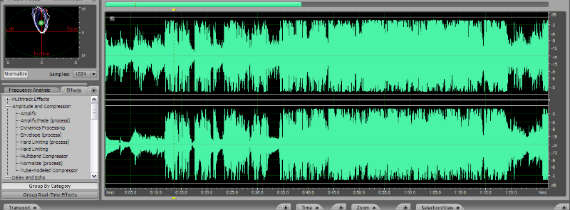



Mastering is a fine art in which the mastering engineer takes a final mix of a song and performs a series of nuanced and carefully executed adjustments and treatments to optimize said final mix for playback on a commercial playback medium such as a car stereo system, an iPod, an entertainment system, etc.
As the last step in the production process, mastering is one of the most crucial steps that can really polish an already great mix and make it sound brilliant or make an average-sounding mix sound great, but if executed poorly, the results can be devastating, sonically speaking.
Experience Over Technology

Nowadays, it’s really easy for modern studio engineers to obtain software to mix and master their own stuff, but as demanding a process as mastering can be, this must be done with the utmost care.
Oftentimes, there are still many engineers who will rely upon the expertise and guidance of a professional mastering engineer who owns his or her own audio mastering studio, which is usually specifically designed and treated just for mastering.
Audio Mastering Software Options
There are plenty of software solutions out there that can get you started if you’re looking to do your own mastering, but you have to get used to the idea that mastering is not a simple “plug and play” process where you slap a limiter or a processor of some sort and slam your mix to the ceiling as hard as possible.
You may get a very loud-sounding mix in the process, but you’ll end up severely distorting the dynamics and transient impact of all the elements in your mix in a such a way that will sound amateur at best. The best way to approach the mastering process is to first have a great mix and make sure that all your elements have been properly balanced and placed accordingly in the acoustic soundscape via EQ, panning, delay, reverb, etc.
Once you have a mix that sounds clean, balanced, clutter-free, punchy, and focused, then you can turn to mastering as a means to sweeten or lightly enhance your mix, and sometimes, if you do it just right, your mix may not need any mastering at all!
Learning How to Master Audio
I had the privilege of mastering a highly energetic punk rock song last night that had a lot of energy and impact, and I realized right away after the first listen that a lot of the mid-range energy would have to be brought out, but I realized that this would have to be done carefully across various stages, which included a light mix of EQing, multiband compression, harmonic excitement, and stereo imaging.
Once I was finished, the guitars sounded a lot fuller, but I managed to do this without drowning out the other elements in the process by applying incremental changes throughout the session and not applying any rigorous processing.
Quite simply, it’s a matter of practice, and if you’re looking into getting into mastering, then start by mastering a song of your own to start off with or perhaps a friend’s song think in terms of increments.
Instead of compressing using a 4:1 ratio, knock it down to 1:4 or 1:2, and instead of boosting your mid-range (let’s say 1k, for example), you may only need to boost it by .5 or 1 dB or maybe 2dB, and if you have to boost any further than that, you should probably revisit your mix to do some re-balancing.